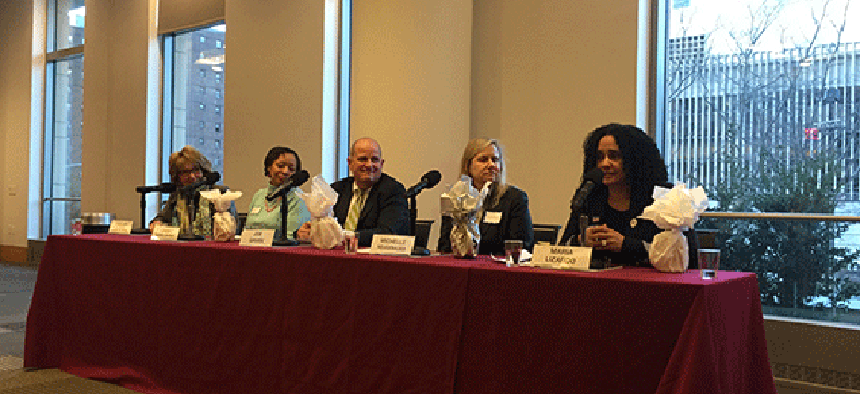From social work to C-suite: Advocating for social workers as nonprofit leaders

“Over the past 20 years there’s been a sea change in the field: Social workers have lost ground in leadership roles.”
This is how NYU Professor Linda Lausell Bryant, a former executive director of Inwood House, described the nonprofit landscape at the Fordham University Graduate School of Social Service’s March 18 panel entitled “Strengthening Communities Through Social Work Leadership for 100 Years.” As nonprofit boards become more corporate in composition, social workers have been relegated to the trenches rather than the helms of organizations, Lausell Bryant said.
In her welcoming remarks, Fordham University Graduate School of Social Services Dean Debra McPhee encouraged students not to undervalue their potential to hold executive roles.
“It’s important for nonprofits to see that due to the more complex skills required of social workers today, (they) are equipped to take on leadership roles,” McPhee said. Those skills include tracking and managing data, as well as handling broader fiduciary responsibilities.
In addition to Lausell Bryant, the distinguished panel – all Executive Directors with social work degrees – included Joseph Girven of James Lenox House and Carnegie East; Maria Lizardo, Northern Manhattan Improvement Corp.; Michelle Neugebauer, Cypress Hills Local Development Corp; and Shelley Wimpfheimer, The Community Chest of Englewood. The panel and the Community Partner Awards presentations, held in Fordham Law School’s sleek new banquet room and timed to coincide with National Social Work Month, offered GSS alumni a forum to tackle key issues facing social workers in the nonprofit sector while toasting the school’s centennial.
Moderator Nancy Wackstein, the new GSS director ofcommunity engagement and partnerships, talked about the increasing pressure on nonprofits to achieve outcomes regardless of limited resources. While this kind of operating climate can be problematic, it’s the type of challenge that social workers are particularly adept at handling due to their ability to combine critical thinking and problem solving.
When Wackstein invited the panel to share how social work skills helped them perform as leaders, the comments touched on being sensitive to and prepared for the significance of the role. The consensus was that their training prepared them for team building, organizing and program development.
Lizardo, who became an executive director just last year, cited her favorite T-shirt slogan: “I’m a social worker, what’s your superpower?”
As a Dominican immigrant, Lizardo added that she is aware that holding her position makes her a de facto role model. “When people tell me they want to speak to the boss – that’s me,” she said. She values the effect that has on those around her. “I grew up in a settlement house so I’m very connected to the community.”
Each panelist also referenced the personal satisfaction they derive from the ability to perform community advocacy within their leadership position.
“Social justice is the end game,” said Lausell Bryant. “It’s bigger than a job: We need to understand people within the context of systems and make our voices heard to make necessary changes.”
“I supervise two senior residences 24/7, “said Girven. “I know everyone by name and treat each resident like I would treat my own parents. It’s about getting back to the mission and feeling passionate about it.”
Patience is also a big factor in the role of “chief advocate.”
“Big change takes time,” Neugebauer said when describing the decade she spent working on public school reform in her community. “You have to learn how to listen actively because we partner with such a wide variety of professions.”
As for advice to the new generation of social workers considering the executive track, two main points emerged: Learn how to manage people and enroll in professional development courses. Keeping up with the curriculum is key to success, Wackstein said.
“You have to take the courses that you think might kill you,” said Wimpfheimer – implying classes on budgeting, health insurance planning and finance.
As an executive coach, she also stressed the importance of self-reflection and owning up to weaknesses. “Those who struggle as EDs don’t self-assess well,” she added.
With 1,100 agency partners, the school’s diverse student body has access to plenty of organizations where they could begin a career and, hopefully, regain lost ground in the C-suite, but Lausell Bryant pointed out that social workers aiming for the top job must be resourceful, and keep connected to the greater social work community. Girven agreed that it’s key to have a strong support system since running a nonprofit can be a “lonely job.”
But the real bottom line, according to Neugebauer, is “fighting for justice and remaining in the vanguard of social change.”
